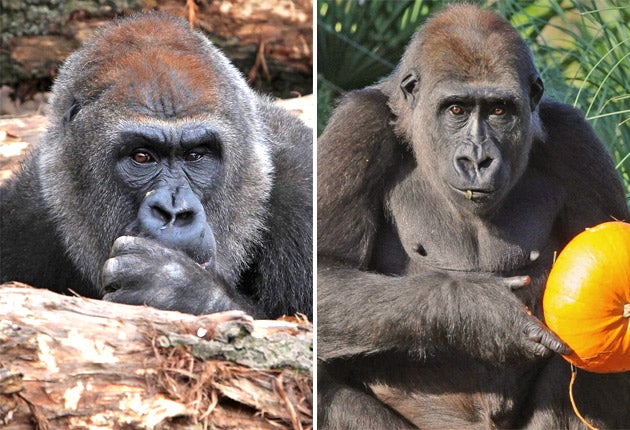Can she handle a new gorilla in her midst?
Dilemma for London Zoo after death of primate harem's dominant male

He comes from a stable family background, takes a healthy interest in the opposite sex and has reached the age when it's time to settle down with a female partner or three.
Kesho, an 11-year-old gorilla born in Dublin Zoo, is to be brought to London Zoo later this month to become the new leader of a harem of three lonely females who were recently bereaved by the sudden and unexpected death of their young male partner.
The move is both delicate and essential because the social organisation of a band of gorillas is centred on the dominant male and without such a leader, the female grouping at London Zoo is likely to split apart in acrimonious bickering, experts believe.
Scientists at London Zoo described yesterday how the decision to bring Kesho to Britain has been a terribly difficult one. One of the females in London, a gorilla called Mjukuu, is pregnant by her dead partner and there is a possibility that Kesho may attack and kill this baby when it is born in November.
Yet it is even more likely that Mjukuu and her baby will suffer badly if no male is introduced to stabilise the social cohesion of the group, which is why London Zoo decided to act quickly and bring Kesho to London this month, said David Field, the zoological director.
"The introduction of a new male in these circumstances is very precarious," Dr Field said. It is known from observations of wild gorillas that when a new male takes over an existing harem he is likely to kill any infants fathered by the previous leader, he added.
Kesho's age and stable family background – he was born in a zoo and raised by his parents – makes him an ideal candidate to take over the role played by Yeboah, the 13-year-old male who died in March following an infection. Kesho, who would be equivalent in age to an 18-year-old man, is still a "blackback" male, meaning that he has yet to achieve the maturity of a fully grown "silverback" lowland gorilla.
This is an advantage because it means that Kesho is likely to "grow into" his new role as leader of the group and perhaps be less inclined to attack the new infant when it makes its appearance later this year. "He's a great male and just perfect to bring into this group. But we only have a small window to introduce such a male," Dr Field said.
The last time London Zoo had a newborn gorilla was 22 years ago, which is one of the reason why it is taking great care over Mjukuu's welfare. Experts in gorilla behaviour will be on hand night and day to oversee Kesho's introduction and his reactions to the three resident females.
"The animals themselves will dictate how the introduction will progress," said Kirsten Pullen, an expert in gorilla behaviour who is advising on the project. After an initial period of visual contact, Kesho will be allowed to join the females but he will be separated if there are any signs of aggression, Dr Pullen said.
It is hoped that Kesho will establish a bond and mate quickly with Mjukuu, which will make it less likely for him to reject the newborn infant. The zoo also hopes that he will mate with another slightly older female called Effie. The third female, Zaire, is believed to be too old to breed.
Yeboah's death in March came just two years after the death of another male, Bongo, which led London Zoo to set up an independent investigation to see if there could have been a connection. Scientists from outside the zoo, however, found no link and concluded that the two deaths in such a short period of time were just an unfortunate coincidence.
Join our commenting forum
Join thought-provoking conversations, follow other Independent readers and see their replies
Comments
Bookmark popover
Removed from bookmarks